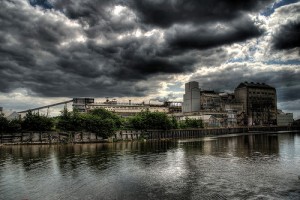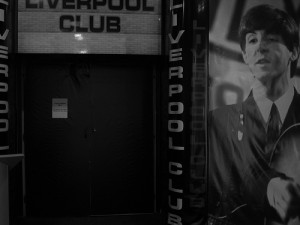
Northwich Salt Factories (part 1), by DaveAdams via Flickr
The local landscape is playing a major part in snowy events on Merseyside this winter. Salt companies in Cheshire are finding a boom in trade as councils run low on supplies of grit for roads. British Salt Ltd in Middlewich is apprarently running 24/7 and still having trouble keeping up with demand.
Ineos in Runcorn is also helping out, with 12,000 tonnes of salt having already left their depot.
Salt has been an incredibly important industry in Cheshire since at least Roman times, and almost certainly prior to that. Middlewich, Nantwich, Northwich and Winsford are all historic salt mining locations. Middlewich was even called Salinae by the Romans, showing how important the location was for salt (salt was, in turn, of extreme importance during the Roman period. Salt could be used as currency, leading to the modern English word ‘salary’).
PS: Love that amazing HDR photo above, by DaveAdams!
Liverpool 100 years ago
The Echo are starting a new history series, looking at Liverpool 100 years ago. The first, introductory article talks about monarchs, strikes and riots, the Titanic and the Suffragettes.
The main photo in the article shows the Mersey in 1907. Of the major Pier Head/Strand buildings only the Port of Liverpool Building has been built, and it stands head and shoulders above everything else in the viscinity. What a change! This building now feels right in the centre of the commercial district, but at the beginning of the 20th Century this merely meant the docks and the Overhead Railway. The other two Graces, and Tower Building etc, are yet to be contructed, and yet to take their place as the centrepiece in Liverpool’s skyline.
Liscard Hall not to be rebuilt
Finally, news reaches us that Liscard Hall, which burned down in 2008, will not be rebuilt. The Hall was built by Sir John Tobin, one time mayor of Liverpool and successful trader. The grounds of what was once known as Moor Heys House became Central Park in 1891.
Plans now include landscaping of the gardens, and linking them more successfully with the nearby rose garden.
See the Geograph page for National Grid Reference SJ3191 site for a photo of the Hall and Central Park.





